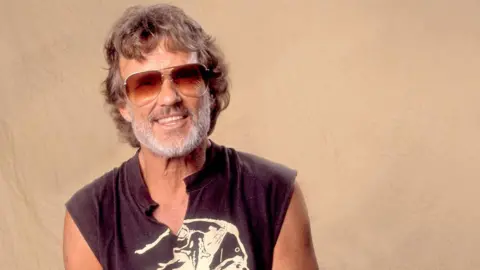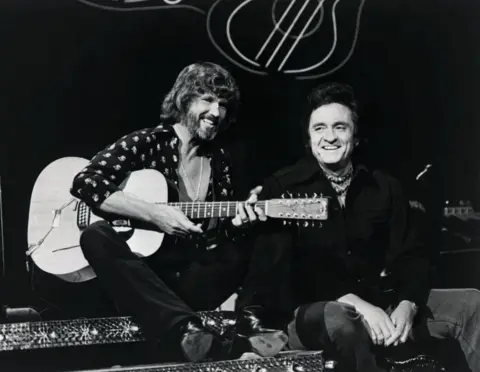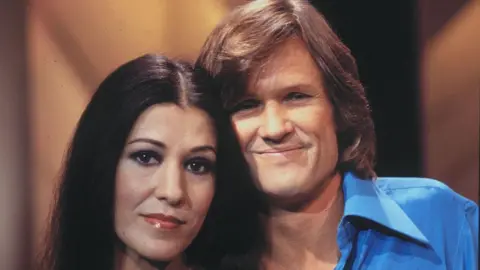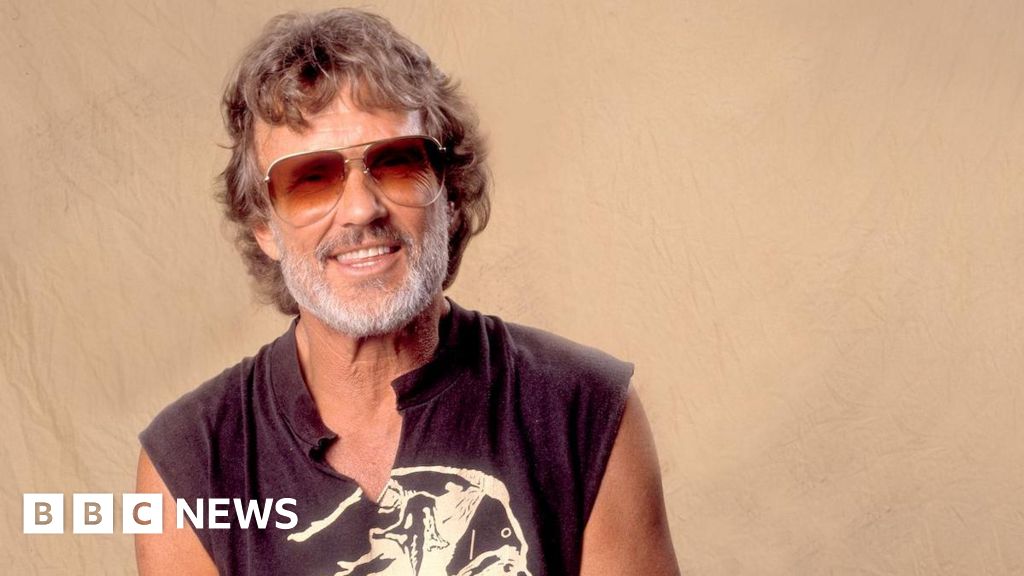 Getty Images
Getty ImagesKris Kristofferson was always modest about his talent.
He disliked being called a poet and preferred it when other people performed his songs.
“I sing like a bullfrog,” he once told record producer Fred Foster.
“Yeah,” Foster replied, “but a bullfrog who communicates.”
Kristofferson’s plainspoken vocals may have lacked range but they carried something more important – conviction.
When he sang of loss and love and sorrow and drunken nights and regret-filled mornings, you believed every word.
That is partly because he never forced a song into existence – “I always had to wait until something hit me, and I could write it,” he once said – but also because he could dig into the simple truth of a sentiment.
His songwriting was not especially complex but what he could do with a few chords and a well turned phrase caused a revolution in country music.
“You can look at Nashville pre-Kris and post-Kris, because he changed everything,” Bob Dylan once said.
To mark his death, at the age of 88, here’s a guide to some of his most memorable songs.
1) Me and Bobby McGee
One of Kristofferson’s most enduring songs, Me and Bobby McGee, started out as a songwriting challenge.
Monument Records founder Foster had a crush on his secretary, Barbara “Bobbie” McKee, and wanted a song that would impress her.
Kristofferson accepted the assignment – but finding inspiration took time.
“I avoided him [Foster] for three or four months because there were only thoughts running through my head,” he said in 1973.
“I was driving back to New Orleans one night, the windshield wipers were going, and it started falling together.”
He based the song on the last scene of the Fellini film La Strada (The Road), in which a broken, inebriated man stares at the sea in despair at what his life has become, and the love he has lost.
Kristofferson turned that tale into the story of two drifters, who find love on the road and are separated, eventually, by death.
It contains one of his greatest lyrics: “Freedom’s just another word for nothin’ left to lose / Nothin’ ain’t worth nothin’ – but it’s free.”
Originally recorded by Roger Miller, it became a number-one hit for Janis Joplin, who recorded it weeks before her death in 1970.
2) Sunday Mornin’ Comin’ Down
 Getty Images
Getty Images“Well I woke up Sunday morning, with no way to hold my head that didn’t hurt.
“And the beer I had for breakfast wasn’t bad, so I had one more for dessert.”
The desolation of Kristofferson’s downbeat delivery tells you this song is about much more than a bad hangover.
And, as it progresses, the protagonist slowly reveals more about the causes of his booze-soaked existence.
The smell of fried chicken reminds him of “something that I’d lost”.
And he stops outside a Sunday school just to hear the children singing.
The loneliness and self-loathing are expressed vividly – and Kristofferson said he had written the lyrics as a struggling musician living in a tenement after his parents had disowned him and his wife and child moved to California without him.
“Sunday was the worst day of the week if you didn’t have a family,” he said.
According to legend, Kristofferson got the song into Johnny Cash’s hands by landing a helicopter in his backyard and refusing to leave until he had listened to his demo tape.
Cash was impressed enough to play the song on his US TV programme.
And the Country Music Association named his recording song of the year 1970.
Kristofferson’s own version appeared on his debut album the same year.
3) Help Me Make It Through the Night
Along with artists such as Willie Nelson and Waylon Jennings, Kristofferson was part of the “outlaw country” scene that fought Nashville’s commercial and creative control.
Discussing his place in the country firmament, in 1970, he told the New York Times: “I’m nobody’s best friend.
“People kept telling me that I’d never make it in Nashville, that I ought to head for California or New York.”
He had upset the establishment, with songs such as Blame It on the Stones and The Law Is for the Protection of the People, which took a swipe at American conservatism.
His most famous song also ruffled feathers for its unadorned depiction of sexual desire, especially when recorded (and taken to number one) by female country star Sammi Smith.
Kristofferson said the lyrics had been inspired by a Frank Sinatra interview.
When asked what he believed in, Old Blue Eyes had responded: “Booze, broads, or a bible… whatever helps me make it through the night.”
Smith’s sensuous delivery was a subversive step forward for country music but Kristofferson’s own version – croaky-voiced and dripping with hunger – is just as much of a thrill.
4) Jody and the Kid
“The first good song I wrote,” Kristofferson said of Jody and the Kid, which he composed while working as a janitor at Columbia Records in the 1960s
Like Me and Bobby McGee, it is steeped in nostalgia and loss, as the musician describes a girl who used to walk everywhere with him, “her little blue jeans rolled up to her knees”.
Over time, they fall in love, and grow old, still walking hand in hand everywhere they go.
As the song ends, the narrator traces their old paths with their daughter – but when the locals greet them, he laments his wife is no longer there to join them.
Kristofferson’s sombre, emotional vocal is both spellbinding and heartbreaking.
It is also worth out checking out his 1999 re-recording of the song (on the album The Austin Sessions), where his older, craggier voice lends it added pathos.
5) Why Me?
If the character in Sunday Mornin’ Comin’ Down was at a low point, this represents them at rock bottom.
“Lord, what have I ever done / To deserve even one / Of the pleasures I’ve known?“
Kristofferson was moved to write the song after attending a service at Jimmie Snow’s church in Nashville.
“Everybody was kneeling down and Jimmy said something like, ‘If anybody’s lost, raise their hand,'” he said.
“I don’t go to church a lot and the notion of raising my hand was out of the question.
“I thought, ‘I can’t imagine who’s doing this,’ when all of a sudden I felt my hand going up.”
After talking to the preacher, Kristofferson said, “I found myself weeping in public” and felt a “forgiveness that I didn’t even know I needed”.
The song works as a reaction to that moment – a slow, mournful realisation of his past behaviour, and a soul-cry for forgiveness.
Recorded with his soon-to-be wife Rita Cooolidge, the gospel-infused ballad struck a chord with audiences in 1973, giving the star his only number one on the country charts.
Further listening: Five more essential songs
 Getty Images
Getty Images6) I Hate Your Ugly Face – The first song Kristofferson wrote, aged 11. A sarcastic rejection of country tropes, it reveals the early development of his storytelling talent.
7) They Killed Him – A lament for Kristofferson’s heroes – Jesus, Ghandi and Martin Luther King – later reinterpreted by Dylan. “Having Dylan cover one of your songs is like being a playwright and having Shakespeare act in your play,” Kristofferson said.
8) Loving Her Was Easier (Than Anything I’ll Ever Do Again) – One of his most romantic songs and Kristofferson’s first chart hit, in 1971. He later re-recorded it with The Highwaymen, a supergroup of outlaw country artists that also featured Cash, Jennings and Nelson.
9) Here Comes that Rainbow Again – Inspired by a scene in John Steinbeck’s The Grapes of Wrath, this touching ballad is about small acts of kindness being repaid. Cash once said it “might be my favourite song by any writer”.
10) Please Don’t Tell Me How the Story Ends – Two lovers spend one last night together, clinging on to their memories (and to one another) in the hope the inevitable break-up never comes. Written in the early 1970s, Kristofferson initially gave it to Billy Bare but later remade it with Rita Coolidge, just as their marriage was dissolving. Their duet is devastating.


